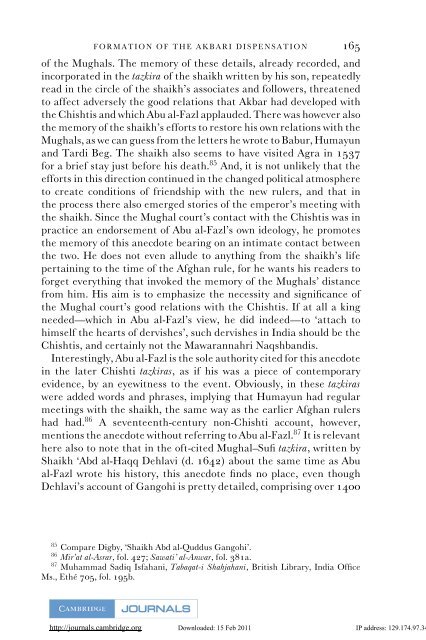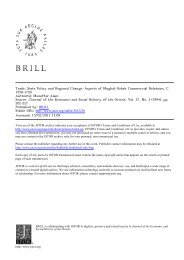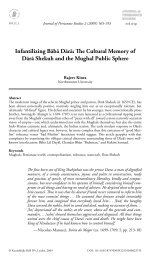The Mughals, the Sufi Shaikhs and the Formation of the Akbari ...
The Mughals, the Sufi Shaikhs and the Formation of the Akbari ...
The Mughals, the Sufi Shaikhs and the Formation of the Akbari ...
You also want an ePaper? Increase the reach of your titles
YUMPU automatically turns print PDFs into web optimized ePapers that Google loves.
FORMATION OF THE AKBARI DISPENSATION 165<br />
<strong>of</strong> <strong>the</strong> <strong>Mughals</strong>. <strong>The</strong> memory <strong>of</strong> <strong>the</strong>se details, already recorded, <strong>and</strong><br />
incorporated in <strong>the</strong> tazkira <strong>of</strong> <strong>the</strong> shaikh written by his son, repeatedly<br />
read in <strong>the</strong> circle <strong>of</strong> <strong>the</strong> shaikh’s associates <strong>and</strong> followers, threatened<br />
to affect adversely <strong>the</strong> good relations that Akbar had developed with<br />
<strong>the</strong> Chishtis <strong>and</strong> which Abu al-Fazl applauded. <strong>The</strong>re was however also<br />
<strong>the</strong> memory <strong>of</strong> <strong>the</strong> shaikh’s efforts to restore his own relations with <strong>the</strong><br />
<strong>Mughals</strong>, as we can guess from <strong>the</strong> letters he wrote to Babur, Humayun<br />
<strong>and</strong> Tardi Beg. <strong>The</strong> shaikh also seems to have visited Agra in 1537<br />
for a brief stay just before his death. 85 And, it is not unlikely that <strong>the</strong><br />
efforts in this direction continued in <strong>the</strong> changed political atmosphere<br />
to create conditions <strong>of</strong> friendship with <strong>the</strong> new rulers, <strong>and</strong> that in<br />
<strong>the</strong> process <strong>the</strong>re also emerged stories <strong>of</strong> <strong>the</strong> emperor’s meeting with<br />
<strong>the</strong> shaikh. Since <strong>the</strong> Mughal court’s contact with <strong>the</strong> Chishtis was in<br />
practice an endorsement <strong>of</strong> Abu al-Fazl’s own ideology, he promotes<br />
<strong>the</strong> memory <strong>of</strong> this anecdote bearing on an intimate contact between<br />
<strong>the</strong> two. He does not even allude to anything from <strong>the</strong> shaikh’s life<br />
pertaining to <strong>the</strong> time <strong>of</strong> <strong>the</strong> Afghan rule, for he wants his readers to<br />
forget everything that invoked <strong>the</strong> memory <strong>of</strong> <strong>the</strong> <strong>Mughals</strong>’ distance<br />
from him. His aim is to emphasize <strong>the</strong> necessity <strong>and</strong> significance <strong>of</strong><br />
<strong>the</strong> Mughal court’s good relations with <strong>the</strong> Chishtis. If at all a king<br />
needed—which in Abu al-Fazl’s view, he did indeed—to ‘attach to<br />
himself <strong>the</strong> hearts <strong>of</strong> dervishes’, such dervishes in India should be <strong>the</strong><br />
Chishtis, <strong>and</strong> certainly not <strong>the</strong> Mawarannahri Naqshb<strong>and</strong>is.<br />
Interestingly, Abu al-Fazl is <strong>the</strong> sole authority cited for this anecdote<br />
in <strong>the</strong> later Chishti tazkiras, as if his was a piece <strong>of</strong> contemporary<br />
evidence, by an eyewitness to <strong>the</strong> event. Obviously, in <strong>the</strong>se tazkiras<br />
were added words <strong>and</strong> phrases, implying that Humayun had regular<br />
meetings with <strong>the</strong> shaikh, <strong>the</strong> same way as <strong>the</strong> earlier Afghan rulers<br />
had had. 86 A seventeenth-century non-Chishti account, however,<br />
mentions <strong>the</strong> anecdote without referring to Abu al-Fazl. 87 It is relevant<br />
here also to note that in <strong>the</strong> <strong>of</strong>t-cited Mughal–<strong>Sufi</strong> tazkira, written by<br />
Shaikh ‘Abd al-Haqq Dehlavi (d. 1642) about <strong>the</strong> same time as Abu<br />
al-Fazl wrote his history, this anecdote finds no place, even though<br />
Dehlavi’s account <strong>of</strong> Gangohi is pretty detailed, comprising over 1400<br />
85 Compare Digby, ‘Shaikh Abd al-Quddus Gangohi’.<br />
86 Mir’at al-Asrar, fol.427; Sawati’ al-Anwar, fol.381a.<br />
87 Muhammad Sadiq Isfahani, Tabaqat-i Shahjahani, British Library, India Office<br />
Ms., Ethé 705, fol.195b.<br />
http://journals.cambridge.org Downloaded: 15 Feb 2011 IP address: 129.174.97.34






